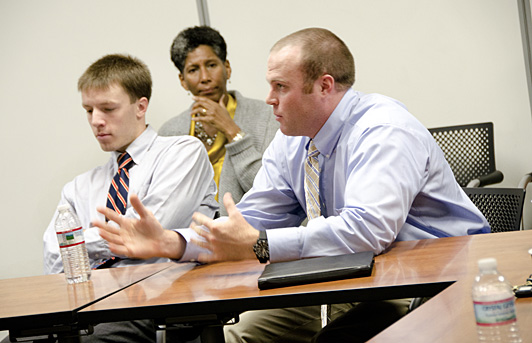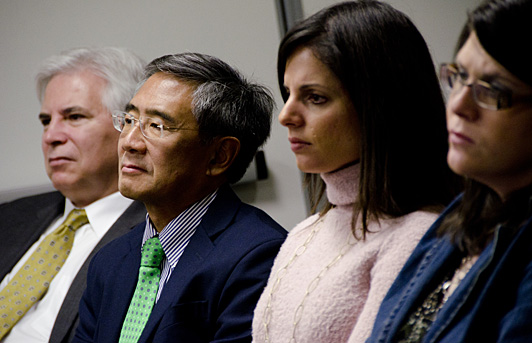To watch Dr. Darrell Kirch’s keynote presentation, click here. To download presentation (130 MB), right click on the folowing link and then select Save As.
http://health.usf.edu/nocms/publicaffairs/now/videos/Dr%20Kirchlecture2012.m4v
Medical schools need to think differently about what excellence means if they are to lead the way towards reforming healthcare, says the leader of the Association of American Medical Colleges.
“One thing that holds us back … We have fallen into a trap, in academic medicine and nationally, about how we judge excellence, said Dr. Darrell Kirch, president and CEO of the AAMC, at a keynote lecture on the USF Health campus Wednesday evening.

Dr. Darrell Kirch (center), president and CEO of the Association of American Medical Colleges, met with students in the SELECT MD program while visiting the USF Health Morsani College of Medicine.
Medical-school excellence, old-style: how high the ranking.
New style? How healthy the community around the school.
Old-style: Mean MCAT scores.
New: Students who are more than smart.
Old: Research funding.
New: Research that makes a difference.
Now is the time to change that thinking, Dr. Kirch said.
“We’ve never needed leadership more than right now in academic medicine and health care,” he said.
Fortunately for the USF Health Morsani College of Medicine, Dr. Kirch said he has seen plenty of examples this week that USF is committed to his “new excellence.”
Those signs include the SELECT physician leadership program, the soon-to-open Center for Advanced Medical Learning and Simulation, and USF’s innovative partnership with The Villages retirement community.

Dr. Kirch praised USF Health’s commitment to interprofessional education and the patient-centered focus of the USF Health Byrd Alzheimer’s Institute, the Diabetes Center, and other programs. He is on campus this week visiting USF Health, touring various sites and learning more about USF’s new projects.
“I have validated something that I suspected about all of you, which is that you are committed to excellence in its really critically important forms right now,” Dr. Kirch said.
Dr. Kirch explored the history of medical education, pointing to how the way healthcare was shaped by key milestones in the history of medical education and healthcare.
Educator Abraham Flexner fought for higher standards in medical education, but what Flexner may not have foreseen, Dr. Kirch said, is that adhering to university standards would make medical education place more value in hierarchy and tradition.
Similarly, Dr. James Wyngaarden, director of the National Institutes of Health during the 1980s, fought to support research scientists, more than doubling NIH funding during his tenure. But he also created a culture that places a great deal of value in the individual.
And when President Lyndon B. Johnson signed Medicare into law, he created better access to healthcare for older Americans. But he also affirmed a medical culture that pays fees for services, so that doctors are rewarded most when their patients are sick, not well.

“It explains why healthcare is the way it is. Healthcare is individualistic, focused on the expert, often fragmented,” Dr. Kirch said.
That must change.
“It may work for us, but it doesn’t work for an awful lot of people in this country,” he said.
Today’s medicine, Dr. Kirch said, is often hierarchical, autonomous, competitive, individualistic, and expert-centered.
The healthcare of the future needs to be collaborative, team-based, service-based, mutually accountable, and patient-centered.
Making that change won’t be easy, he said. It will require broad systemic change.

“Some have said it’s like trying to redesign an airliner – in flight,” he joked.
That’s why academic medicine must change how it educates students and approaches education, he said. He’s criss-crossing the United States, seeking out new ideas medical schools are pursuing and pushing medical educators to enact new models of excellence.
“I’m optimistic,” Dr. Kirch said. “Because what I’ve seen is a commitment to excellence that is emerging in new ways.”
– Story by Lisa Greene, photos by Eric Younghans, and video production by Amy Mariani and Elizabeth Peacock, USF Health Communications
